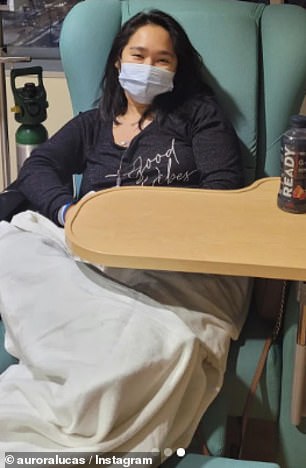When Aurora Lucas started experiencing chest pain in August 2021, she initially dismissed it as stress.
She was busy. She had recently moved to Chicago to start a new teaching job and was in the second year of her doctoral program. But when the pain didn’t go away and she developed a cough, fatigue and back pain, she went to the emergency room.
He never imagined he would receive the diagnosis that finally came three months after that first hospital visit. He had advanced lung cancer, at 28 years old. Aurora had never smoked.
It took tests by three different doctors to reach the correct conclusion, and two of them ruled out his symptoms as the result of a lung infection.
‘D“The doctors over and over again did everything else and suspected everything except the word cancer,” Aurora, now 31, said in a video posted on her account. tiktok channel.

Mrs. Lucas was diagnosed with lung cancer when she was only 28 years old. She had to leave teaching to improve, but she was able to continue earning her Doctor of Education degree. Now, at 31, she is entering the thesis phase of the program.
Now, as she recovers from treatment, she wants to raise awareness about the signs of the disease and remind others that no one is immune, no matter their age.
“The scary thing is that this is a hidden disease, you know it’s not diagnosed until much later, stage three or four, and it’s usually quite aggressive,” Aurora said.
Aurora’s story comes amid a global rise in early-onset cancers, with an increasing number of patients diagnosed before the age of 50.
Early-onset cancer of all forms increased 79 percent between 1990 and 2019 globally, according to an analysis published in the journal BMJ Oncology.
Although these rates increase most for colorectal and breast cancer, some measures suggest that lung cancer cases in those under 40 years of age are also increasing.
In recent decades, lung cancer rates have decreased in almost all demographic groups except people under 40 years of age.
Only 1.4 percent of all people with lung cancer are diagnosed before age 35, approximately 3,000 Americans.
However, when the disease affects young people, it is often diagnosed in later stages, when treatments are less effective.
When Aurora’s cancer was detected, the cancer had spread to the lymph nodes and was classified as stage three.
About 37 percent of those diagnosed with lung cancer at this stage live five years after their diagnosis.
Symptoms began in August 2021. They included chest pain, persistent cough, and back pain. She also developed fatigue so severe that she had to stop driving for fear of falling asleep at the wheel.
“Those were huge signs that I thought were just stress when I was 28,” he said.
Shortly afterward he made an appointment with his primary care doctor. He told her she looked great and recommended she eat some honey for her cough.
About a week later, his chest pain had not gone away, so he went to the hospital, where he was diagnosed with a rare condition that affects the way the heart is wired, called Wolf Parkinson White syndrome.
At that point, doctors did a chest scan and saw “a haze” that they thought perhaps was an infection or tuberculosis.
But her insurance wouldn’t cover any more tests, so doctors sent her home. Three weeks later, she returned to the emergency room because her cough was getting worse and she could barely speak.
She had to ‘beg’ the nurse to allow her to do more tests, offering to pay for the expensive scans since insurance wouldn’t cover them, Aurora shared in a podcast called Patient from Hell.
The nurse performed a biopsy, which was inconclusive and she was sent home.
Finally, on December 1, 2021, her insurance changed and she went to a new doctor who marked her case as urgent and sent her for a series of tests.
Five days later he was diagnosed with lung cancer.
“Many doctors denied that it was actually lung cancer,” he said.
This was a shock to her and her family, she had never smoked and although her grandmother developed the disease, it was not until she was 60 years old.
They recommended two rounds of chemotherapy and 30 days of radiation.
That initial stage concluded in February 2022, and shortly afterward he was prescribed a medication designed to treat his particular type of cancer.
His doctors told him that anonymous oral therapy, which still continues today, is like a “cancer police.”
She is examined every three months to make sure the cancer has not progressed.
At any time, the medication could stop keeping her cancer under control and she could find that her cancer has returned, she said.
Despite that looming worry, he leads a busy and active life. She is now entering the thesis phase of her PhD and spends time traveling with her family while online patient advocacy.
On TikTok, he answers viewers’ questions about lung cancer and explains the importance of regular screening, since for many people symptoms don’t start until the disease is very advanced.
Especially for young people, Ms. Lucas said, “it’s so important to get tested and monitored and stay connected to your body.”


